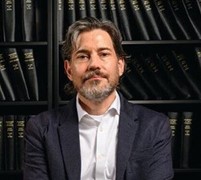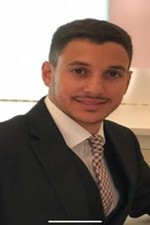contact
Jade Sutton
Administrative Assistant II
Oral Squamous Cell Carcinoma and Artificial Intelligence in Oral Medicine & Pathology
| Date: | Friday, November 3, 2023 |
| Time: | 9 a.m. to 3:30 p.m. |
| Location: | University of Maryland School of Dentistry, at 650 W. Baltimore Street, Baltimore, MD 21201 |
| Tuition: | Dentist: $325.00 Dental Team: $195.00 |
| Credits: |
6 CDE credit hours - lecture The University of Maryland School of Dentistry designated this activity for 6 Continuing Dental Education hours. |
| Target Audience: | Dental Professionals |
| Presented by: | John Basile, DDS, DMSc and Ahmed S. Sultan, BDS, PhD |
| Conflict of Interest: | Nothing to disclose. |
Register Here
Speaker Biography
 Dr. John Basile is a highly accomplished dental professional with a strong background in oral pathology and research. He earned his DDS degree from the State University of New York at Stony Brook and further enhanced his training through a one-year dental residency at the VA Hospital in Washington, DC.
Dr. John Basile is a highly accomplished dental professional with a strong background in oral pathology and research. He earned his DDS degree from the State University of New York at Stony Brook and further enhanced his training through a one-year dental residency at the VA Hospital in Washington, DC.
After practicing dentistry for three years, Dr. Basile pursued specialized training in oral pathology and research at Harvard Dental School. In 2002, he graduated with a degree in Oral Biology and achieved the esteemed status of Fellow of the American Academy of Oral and Maxillofacial Pathology.
Dr. Basile served as a Post-doctoral Research Fellow at the National Institute of Dental and Craniofacial Research, NIH, in Bethesda, MD. Currently, he holds the position of Associate Professor at the University of Maryland School of Dentistry, in the Department of Oncology and Diagnostic Sciences. He is also a member of the Molecular and Structural Biology branch of the Marlene and Stuart Greenebaum Cancer Center at the University of Maryland School of Medicine.
Dr. Basile obtained board certification as an oral and maxillofacial pathologist in 2008. His wealth of experience, combined with his research contributions and academic positions, makes him a valuable resource in the field of dental education and pathology. His expertise and dedication continue to drive advancements in oral health, ultimately benefiting patients and dental professionals alike.
 Dr. Ahmed Sultan is a distinguished dental professional specializing in Oral Medicine and Oral Pathology. As an assistant professor in the Department of Oncology & Diagnostic Sciences at the University of Maryland School of Dentistry, Dr. Sultan brings a wealth of knowledge and expertise to the field.
Dr. Ahmed Sultan is a distinguished dental professional specializing in Oral Medicine and Oral Pathology. As an assistant professor in the Department of Oncology & Diagnostic Sciences at the University of Maryland School of Dentistry, Dr. Sultan brings a wealth of knowledge and expertise to the field.
Dr. Sultan’s academic journey began at Trinity College Dublin, Ireland, where he graduated with honors, obtaining a BA degree and a dental degree (BDS) in 2013. He completed his Oral Medicine Residency at Harvard, is board certified by the American Board of Oral Medicine and holds the prestigious title of Fellow in Oral Medicine from the Royal College of Surgeons of Edinburgh.
Dr. Sultan completed a Ph.D. in Mycobiology and an Oral & Maxillofacial Pathology Residency Program at the University of Maryland School of Dentistry. His dedication to excellence is evident as he is currently a diplomate of the American Board of Oral and Maxillofacial Pathology and a fellow of the American Academy of Oral and Maxillofacial Pathology.
Currently, Dr. Sultan serves as the Co-Director of the Oral Medicine Programs at both the University of Maryland Marlene and Stewart Greenebaum Comprehensive Cancer Center and the University of Maryland School of Dentistry. He also holds the position of Program Director for the Oral & Maxillofacial Pathology Residency Program at the University of Maryland School of Dentistry and is an Oral Pathologist for Oral Pathology Consultants, located at the University of Maryland School of Dentistry.
Dr. Sultan’s passion for research is reflected in his active research lab, which focuses on utilizing artificial intelligence, particularly deep learning, for image segmentation in Oral and Maxillofacial Pathology. He also serves as the Director of the Division of Artificial Intelligent Imaging Research at the University of Maryland School of Dentistry. His contributions to the field are evident through his extensive publication record of 61 journal articles and his involvement as a Principal Investigator or Co-Investigator in several institutional and extramural grants.
Course Description
Oral Squamous Cell Carcinoma- From Pathogenesis to Diagnosis Course Description:
Part 1 of the course will cover oral squamous cell carcinoma (OSCC) with an emphasis on etiology and pathogenesis, including a summary of the different genetic changes that lead to malignant transformation, not all of which involve tobacco and alcohol consumption. A review of the differential diagnosis of white, red, and mixed red-white lesions will be presented, along with helpful clinical clues that can be used to distinguish benign from malignant. Finally, human papillomavirus-induced OSCC and proliferative verrucous leukoplakia (PVL), a pre-malignant condition, will be discussed, as these entities are becoming more common in our patient populations.
An Introduction to Artificial Intelligence in Oral Medicine & Pathology Course Description:
Part 2 of the course will provide an introduction to the various applications of AI in the fields of Oral Medicine & Pathology and will provide an overview of limitations and ethical considerations for the currently available technologies. The audience will first be provided with several interesting oral radiology, oral medicine, and oral pathology cases and have an opportunity to compete against the AI in diagnosing these cases. Part 1 of the course will help prepare the audience to challenge some of the cases.
Course Objectives
Oral Squamous Cell Carcinoma- From Pathogenesis to Diagnosis Course Objectives
During this lecture, participants will:
- Be able to understand the genetic changes affecting oral mucosal epithelium that lead to transformation to cancer.
- Be able to provide clinical information that could help distinguish which mucosal lesions are reactive or inflammatory vs. potentially malignant.
- Be able to briefly summarize what is known about PVL and HPV-induced OSCC.
An Introduction to Artificial Intelligence in Oral Medicine & Pathology
During this lecture, participants will:
- Be able to provide a definition for Artificial Intelligence (AI)
- Be able to recognize the main components of AI Classification
- Be able to provide examples of Applications of AI in Daily Life
- Be able to provide examples of Applications of AI in Medicine, Dentistry, Pathology
- Be able to identify the current Limitations and Ethical Considerations of AI
- Be able to provide examples of Future Applications of AI in Healthcare
